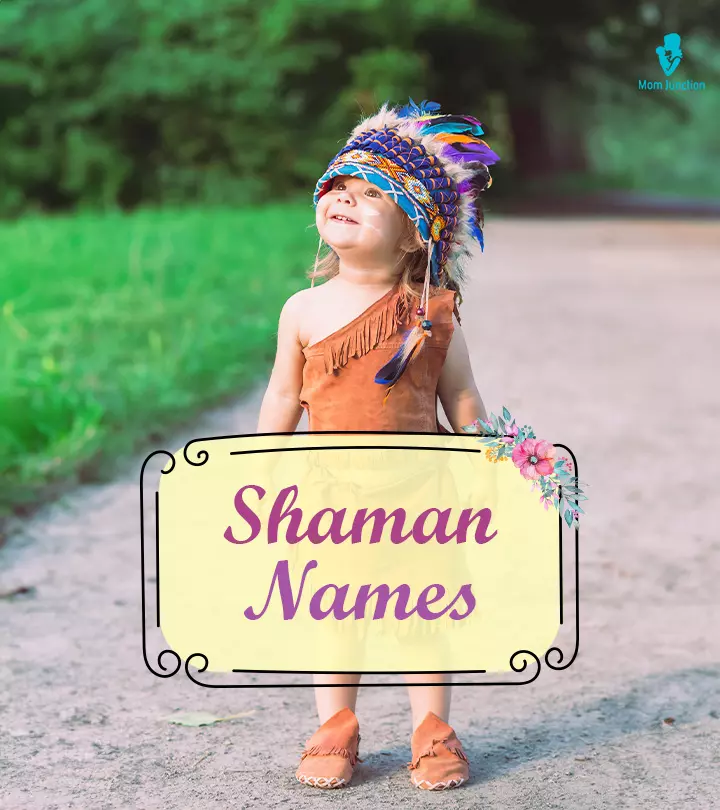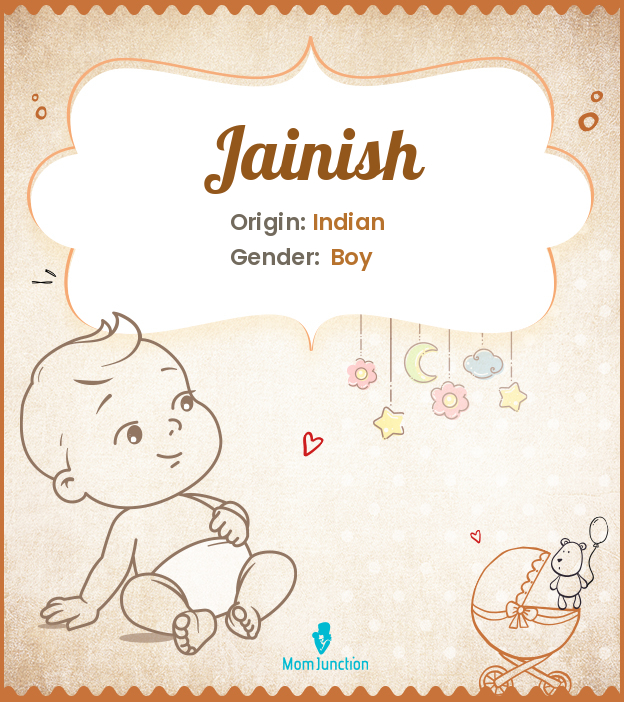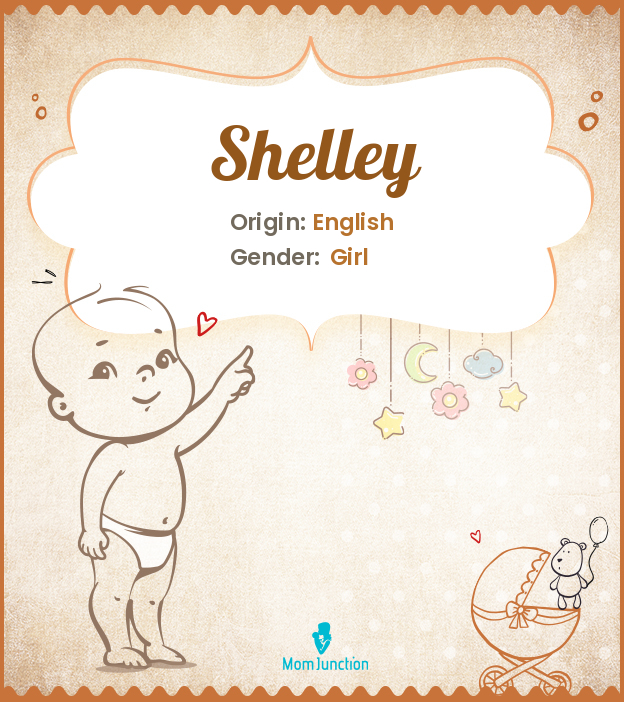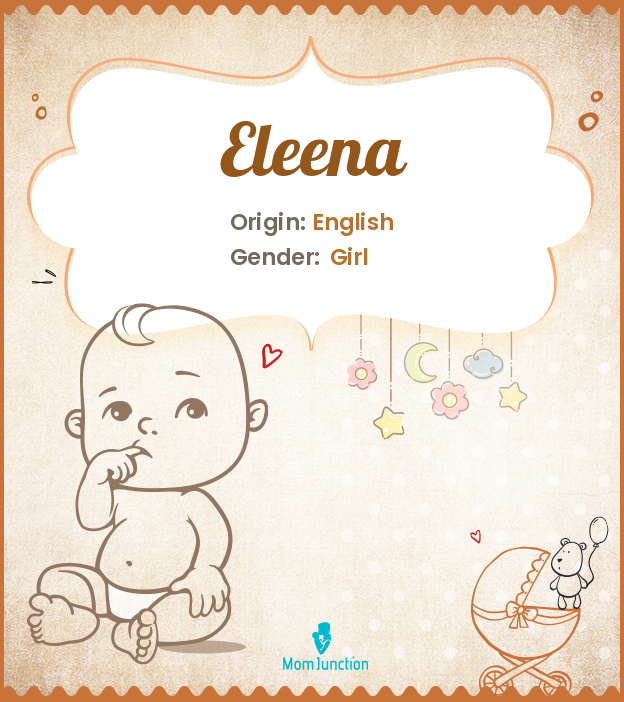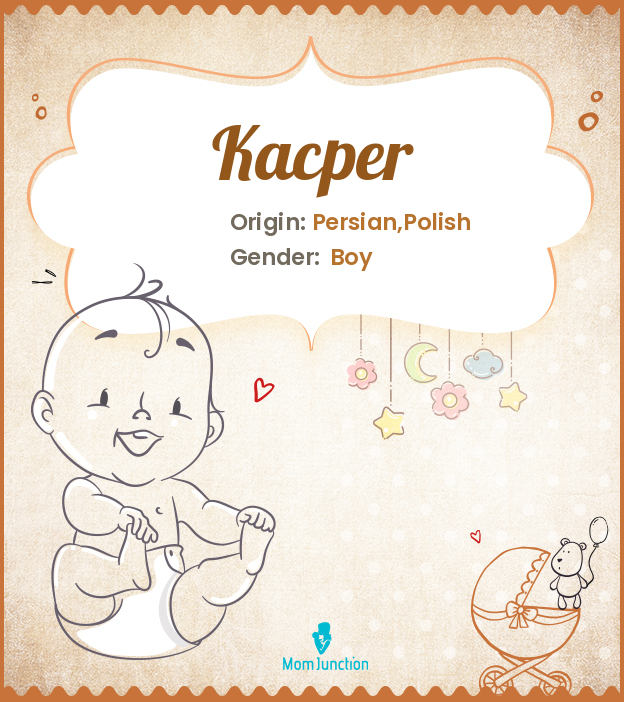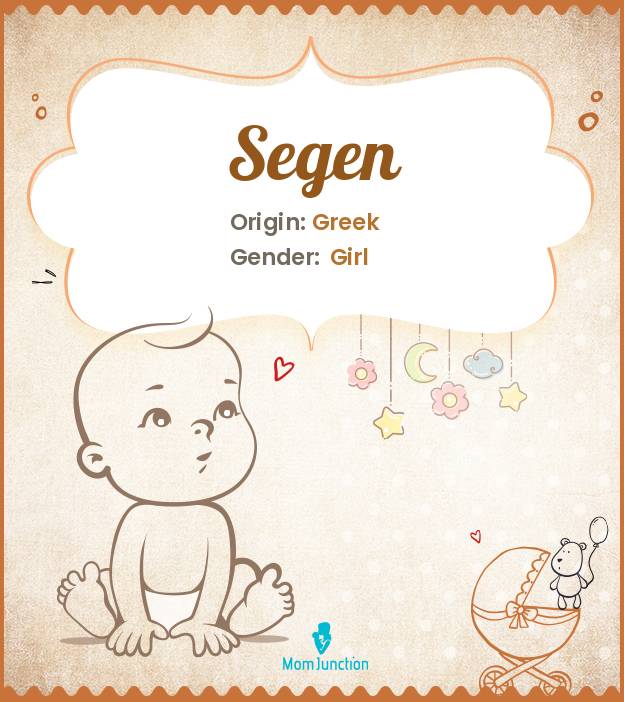
Image: ShutterStock

Wales is a mountainous country on the western side of central southern UK, where Welsh is the predominant language in most parts, particularly in North Wales and West Wales. However, English is widely used in South Wales. Welsh surnames or last names could also be used among non-natives, so you could consider choosing a surname for your baby from this beautiful language. Most Welsh last names are derived from paternal lineage and are patronymic. During the Middle Ages, they added prefixes like “ferch” (meaning “daughter of”) and “ab,” “ap” (meaning ‘son of’) to their surnames. However, the patronymic system gradually gave way to fixed surnames, reflecting changes in social structures and cultural practices over time (1). Welsh surnames are mostly derived from English and Welsh, while some originated from Celtic. Here, we have combined some Welsh surnames and last names if you are keen to give a Welsh name to your child. Read on and take your pick!
Key Pointers
- Wales is a mountainous country in the UK, where Welsh and English are the main languages.
- Most Welsh surnames are derived from paternal lineage, following a patronymic system.
- Welsh surnames have various meanings, often derived from personal characteristics, toponyms, or occupations.
- Some Welsh surnames are formed by combining two Welsh words; for example, Carew, Edris, and Trevor.
List Of Common Welsh Surnames With Meanings
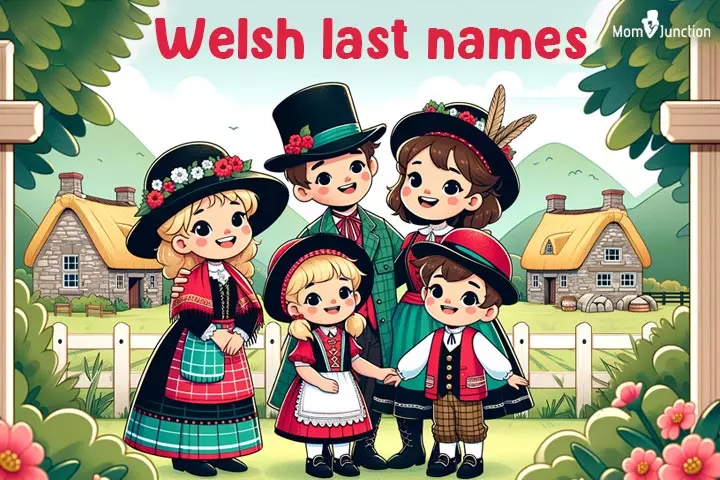
Image: Created with Dall.E
1. Awbrey
The Norman name arrived in Wales after the Norman Conquest of the Wales region. The original bearer of the name was known to live in a place planted with elder trees, and it is also a derivation of Baptismal name meaning ‘son of Aubrey.’
2. Bach
It was used as a nickname for a short or small man, and is taken from the Welsh word, ‘bach’ meaning ‘little.’
 Trivia
Trivia3. Baughan
It is derived from the Welsh words ‘bychan,’ which mean little or small. This surname is also a family name in Oxfordshire in England. The Welsh surname Baughan likely originated as an ironic nickname for a tall person or to distinguish the younger of two individuals with the same name.
4. Beavin
This is a patronymic name created from the Welsh name Bevan, which itself is derived from ‘ab-lefan’ or ‘ap-lefan.’ The prefix ‘ab’ or ‘ap’ means ‘son of,’ and thus the name means ‘son of lefan.’ The name ‘Lefan’ is likely the Welsh version of the name John.
5. Beddoe
It is a variant of the name ‘Bedo,’ which is the pet form of the Welsh name Meredith, meaning ‘sea lord’ or ‘protector of the sea’ in Welsh. Beddoe might also be derived from Bettws or Betws, from the Old English bed-hus, meaning a ‘house of prayer’ or ‘oratory.’
6. Bennion
It is the anglicized form of the name ‘ap Einion’ meaning the ‘son of Einion.’ The name Einion is the Welsh word for ‘anvil.’ Bennion is associated with Alan Bennion, a British actor known for his roles in Doctor Who and the police drama Z-Cars.
7. Bethel
It is a patronymic surname and an anglicized form of Welsh name ‘ab Ithel’ or ‘son of Ithel’ meaning ‘bountiful Lord.’
 Quick fact
Quick fact8. Blayney
This is derived from the Welsh words ‘blaenau’ meaning ‘uplands’ or ‘blean’ meaning ‘a river source.’ The name is also associated with the place called Castleblayney in Ireland.
9. Breckon
It is a toponymic name for someone from the county of Brecon, also called Brecknockshire, in south Wales. The name is also said to be the name of a 6th century Welsh prince from the same place.
10. Caddell
This is derived from the Old Welsh personal name ‘Cadell’ that itself comes from the Welsh word ‘cad’ meaning ‘battle.’ The surname was popularly associated with the 7th-century saint Cadell ab Urien.
11. Cadogan
It is a derivative of Old Welsh family name Cadwgan, where ‘cad’ means ‘battle’ and ‘gwgan’ means ‘glory.’ The surname thus means ‘glory in battle’ or ‘honor in battle.’
12. Cardiff
It is a toponymic name for someone from the Welsh city of Cardiff. The name Cardiff comes from a combination of two Welsh words, namely ‘caer’ meaning ‘fort and ‘taf’ meaning ‘stream of water.’
 Trivia
Trivia13. Carew
It is a toponymic name for anyone from the several places of the same name in Wales, including a castle called Carew. The name is a combination of the Welsh words ‘caer’ meaning ‘fort’ and ‘rhiw’ meaning ‘hill’ or a ‘slope.’ The Welsh surname Carew traces back to the Anglo-Normans. Over time, the Carew family’s influence spread across England, Ireland, Scotland, and later to Canada, the U.S., and Australia (2).
14. Cecil
It is taken from the Old Welsh name ‘Seisyllt’ that is derived from the Latin name ‘Sextilius.’ The name ‘Sextilius’ comes from the Latin word ‘sextus’ meaning ‘sixth.’ The name ‘Cecil’ could also be the modified form of the Latin name ‘Caecilius,’ which is derived from ‘Caecus,’ the Latin word for ‘blind.’
15. Collins

This surname is derived from ‘Collen,’ which is a Welsh word for hazel or a hazel grove. Hazel is a shrub and the source of hazelnut. This surname likely has English and Irish origins.
16. Coslett
This is a variant name of Corslett or Cosslett that is considered to have migrated to Wales from Germany. The exact origin of the name is unknown. The surname is common in northern Wales and around Liverpool in England.
17. Craddock
This is a derivative of the Welsh personal name, Caradoc which traces its origin to the ancient Celtic name ‘Caratacos.’ The Celtic name comes from the Celtic word ‘car’ meaning ‘love.’ The Welsh surname Craddock is popularly associated with Billy Wayne ‘Crash’ Craddock, an American country and rockabilly singer.
18. Davies
It is the Welsh variant of the name ‘Davis’ that means ‘son of David.’ The name ‘David’ itself comes from Hebrew and means ‘beloved.’ The Welsh surname Davies is especially common in southwest England, notably in Cornwall. It’s also widespread in northwest England, particularly near the Welsh border
19. Dee
It is derived from the Welsh word ‘Du’ meaning black or dark. The name ‘Dee’ likely started as a nickname for a person with a dark complexion or dark skin color. Another origin could be the River Dee in Wales. In this case, the name could be a toponymic one referring to those who lived along the banks of the Dee River.
20. Dew
It is considered to be one of the new names that migrated to England after the Norman Conquest. The name means ‘treasured one’ in Welsh.
21. Edris
It is a variant of the Welsh personal name Idris, which is composed of two Welsh elements, namely ‘uud’ meaning ‘lord’ and ‘ris’ meaning ‘impulsive’ or ‘ardent.
22. Edwards
It is a patronymic name that means ‘son of Edward.’ The name Edward itself comes from Old English words ‘ead’ meaning ‘wealth’ or ‘fortune,’ and ‘weard’ that means ‘guard.’ The name Edward thus means ‘rich guard.’
23. Elijah
The name means ‘my god is Yahweh’ or ‘my god is lord’ in Hebrew. Elijah has been the name of several saints in the past. The Welsh surname Elijah likely traces back to the biblical prophet Elijah, a significant figure known for his courage and faith (3).
24. Ellis
It is a derivative of the Welsh personal name ‘Elisedd,’ which is derived from the Welsh word ‘elus,’ meaning ‘kind’ or ‘benevolent.’ This surname has been the name of a few kings that ruled over Wales.
25. Evans
It is a patronymic name that means ‘son of Evan.’ The name Evan is the anglicized version of ‘lefan,’ which is the Welsh version of John.
26. Eynon
This is a derivative of the Welsh personal name ‘Enion’ that comes from the Welsh word ‘Einion’ meaning ‘anvil.’
27. Flint
It is a toponymic name for someone from the place called Flint in the Flintshire county of Wales. The place is famous for its Flint Castle.
28. Flower
It is an anglicized form of the Welsh personal name ‘Llywarch’ that has an unexplainable origin. The surname may be of English origin where it refers to a blossoming flower or a derivative of Old French word ‘flur’ meaning ‘flower.’
29. Floyd
It is a variant of the surname Lloyd that is a derivative of the Welsh word ‘llwyd’ meaning ‘gray.’ The word ‘llwyd’ is also used to refer to the color ‘brown.’ The name may have been a reference to a young man.
30. Gaynor
It is a variant of the feminine name ‘Gaenor’ that came from ‘Gwenhwyfar,’ a compound of Welsh elements ‘gwen’ meaning‘fair,’ ‘wyf’ meaning ‘smooth,’ and ‘fawr’ meaning ‘large.’ A few variants of the name Gaynor are Guinevere, and Jennifer, which is a popular feminine name.
31. Gethin
It is derived from the Welsh name ‘Cethin,’ meaning ‘ugly’ or ‘hideous.’ The Welsh surname Gethin originated in Cheshire, where the family established themselves near Malpas as Lords of the Manor.
32. Glace

It is the anglicized form of the Welsh word ‘Glas,’ which means ‘green’ or can even refer to ‘silver-gray.’ The name could have originally been a nickname.
33. Goff
It is a variant of the name ‘Gough’ that comes from the Welsh word ‘coch’ meaning red. The name likely began as a nickname for someone with red hair or a reddish complexion. It could also be derived from gof, meaning ‘smith,’ reflecting an occupational origin. It shares roots with the Breton goff and is also cognate with the Irish gobha, all referring to a blacksmith.
34. Gower
It is a toponymic name for someone from the Gower peninsula, which lies to the south-west of Wales.
35. Griffiths
It means ‘son of Gruffudd.’ The name Gruffudd comes from the Old Welsh name ‘Griphiud’ meaning ‘chief’ or ‘lord.’
36. Guild
It is an anglicized form of Welsh surname ‘Gwyllt,’ a nickname that means ‘wild’ in Welsh.
37. Gwalchmai
It is derived from two Welsh elements, ‘gwalch’ meaning ‘hawk and ‘mai’ meaning ‘field.’ It is also the name of a village in Anglesey, an island off the north-western coast of Wales.
38. Hanmer
This surname is likely a toponymic one, referring to Hanmer within the Wrexham County of Wales. The name means ‘lake’ or a ‘pond’ in Old English.
39. Havard
The name is of uncertain origin but is considered a toponymic one. It could refer to someone from the place called Hereford in the Herefordshire county of England. The name Hereford is a combination of the Old English words ‘here’ meaning ‘army’ and ‘ford’ meaning ‘ford’ (a shallow section of a river or a stream).
40. Hier
It is derived from a descriptive nickname derived from the Welsh word ‘hir’ meaning ‘long’ or ‘tall.’ The Welsh surname Hier likely traces back to Prussia, where it emerged in medieval times.
41. Hopkins
It is a patronymic Welsh surname meaning ‘son of Hopkin.’ The name Hopkin is a derivative of the name ‘Robert’ that comes from the Old Germanic name ‘Hrodebert’ meaning ‘bright fame.’ A prominent figure with the surname is Johns Hopkins, an American merchant and philanthropist.
42. Howell
It is an anglicized form of the Old Welsh name ‘Hywel’ which means ‘eminent.’ It was a popular name during the Middle Ages and also the name of a ruler of Wales.
43. Hughes
It is the Welsh variant of the surname ‘Howells,’ which means ‘son of Howell.’ Another origin could be the name ‘Hugh,’ which comes from the Old Germanic word ‘hug’ meaning ‘heart’ or ‘spirit.’ The Welsh surname Hughes gained wide recognition through Edward James “Ted” Hughes, an acclaimed English poet and writer.
44. Idle
It is a derivative of the Welsh personal name ‘Ithael,’ which comes from Old Welsh name ‘ludhail,’ meaning ‘bountiful Lord.’
45. Ithell
It is a variant of the name ‘Ithael,’ which traces its origins to the Old Welsh name ‘ludhail’ meaning ‘bountiful Lord.’
46. James
It is adapted from the first name ‘James.’ The name ‘James’ originated from the Hebrew name ‘Jacob,’ which means ‘supplanter.’ The name likely came to Great Britain during the Norman Conquest. The Welsh surname James gained popularity due to its biblical roots, referring to James, the son of Mary and Joseph and half-brother to Jesus (4). This strong biblical association contributed to the widespread use of James as both a surname and given name.
47. Jenkins
It means ‘son of Jenkin.’ The name Jenkin is derived from the name ‘John’ with the suffix ‘kin’, thus the name likely referring to ‘John’s family.’
48. John
It is a popular biblical name that is a variant of the Hebrew name ‘Yochanan’ meaning ‘Jehovah has been gracious’ or ‘god is gracious.’ The Welsh surname John gained popularity due to its biblical roots, inspired by the Apostle John, author of five New Testament books, including the Gospel of John and The Book of Revelation (5).
49. Jones
It is a variant of the name ‘Jon,’ which originates from the name John. The surname Jones gained popularity in England, with early records dating back to 1273, listing Matilda Jones.
50. Keelan
It is a toponymic name for someone from any of the several places called Cilan in Wales.
51. Kemble
It is derived from the Old Welsh personal name ‘Cynbel’ that is composed of the Old Welsh elements ‘cyn’ meaning ‘chief’ and ‘bel’ meaning ‘war.’ The name thus means ‘war chief.’
52. Kendrick
It is derived from the Old Welsh name ‘Cynwrig,’ which is a combination of elements ‘cyn’ meaning ‘chief’ and ‘gwr’ meaning ‘man.’ It is a popular surname in Wales and counties bordering England.
53. Kneath
The name is likely a toponymic one and likely derived from the name Neath – the name of several places including a river in Wales.
54. Kerry

The surname comes from Old Welsh and means ‘near the castle.’ It probably originates from the parish of Kerrey in Montgomery County, Wales.
55. Lewis
It is derived from the Welsh name ‘Llywelyn,’ which likely originated from the Welsh word ‘llyw,’ meaning ‘leader.’ Another variant of the name Lewis is Lewison.
56. Lloyd
It comes from the Welsh word ‘llwyd’ meaning ‘gray’ or ‘brown.’ The name may have been a nickname or a reference to young men.
57. Maddocks
It is derived from the Welsh personal name ‘Madoc,’ which comes from the Welsh word ‘mad,’ meaning ‘good’ or ‘fortunate.’ The other alternatives of the name are Maddox, Mattock, Maddick, Maddog, Mattack and Madog.
58. Meredith
It is derived from the Old Welsh names Meredydd or Maredudd, which means ‘great lord’ or ‘sea lord.’ Another origin of the name could be the Old Welsh name Morgetiud, with its first part meaning ‘pomp’ or ‘splendor’ and second portion meaning ‘lord.’
59. Merrick
It originates from the Welsh name ‘Meurig,’ which is the Welsh form of the name ‘Maurice.’ The name ‘Maurice’ comes from the Late Roman name ‘Maurus’ meaning ‘dark-skinned.’
60. Moore
It is a derivative of the Welsh word ‘mawr,’ meaning ‘big’ or ‘large.’ It may have been originally a nickname for a large or big man.
61. Morgan
This is a derivative of Old Welsh personal name ‘Morcant’ composed of the Welsh elements ‘mor’ meaning ‘sea’ and ‘cant’ meaning ‘circle.’ It is a popular surname in Wales and other parts of Great Britain as well.
62. Morris
It is an anglicized form of Welsh personal name ‘Maurice’ that comes from the Late Roman name ‘Maurus’ meaning ‘dark-skinned.’
63. Moss
It is derived from either Old English ‘mos’ meaning ‘peat-bog’ or Irish ‘Maolmona’ referring to an ancient Gaelic devotee. Another origin of the name could be the Hebrew name ‘Moses.’
64. Mostyn
It is a toponymic name from someone from the place called Mostyn in Wales. The name of the place comes from Old English and means ‘moss town.’ The Welsh surname Mostyn gained popularity in the 13th century, particularly in Flintshire, among families descended from Wales’ noble tribes.
65. Myrick
It is a variant of the Welsh name ‘Myrick’ that ultimately traces its origins to ‘Maurice.’ The name ‘Maurice’ comes from the Late Roman name ‘Maurus’ meaning ‘dark-skinned.’
66. Nanney
It is a toponymic surname derived from the name of a place called Nannau in Wales. The root word for the name is the Celtic word ‘nant’ meaning ‘brook.’
67. Nest
It is the Welsh form of the name ‘Agnes.’ The name Agnes comes from the Greek name ‘Hagne’ meaning ‘pure’ or ‘holy.’
68. Nevitt
It is derived from the Old English word ‘cniht’ that meant a ‘young man’ or a ‘knight.’ The name ‘Nevitt’ could also be the anglicized form of the Old Welsh name ‘Ednyfed.’ This name likely comes from the Welsh names ‘Edenevet’ or ‘Eidniuet’ composed of two Welsh elements, ‘iud’ meaning ‘lord’ and ‘nemeto’ meaning ‘sacred grove.’
69. Owen
It is derived from the Welsh personal name ‘Owain,’ which is likely the Welsh form of the name ‘Eugene.’ The name Eugene comes from the Greek name ‘Eugenios’ that means ‘well-born’ or ‘noble.’
70. Parry
This is a patronymic name that is an anglicized version of the Welsh name ‘ap Harry’ meaning ‘son of Harry.’ The name Harry is derived from the name ‘Henry,’ which comes from the Germanic name ‘Heimirich’ meaning ‘home ruler’ or ‘ruler of the homeland.’
71. Pembroke
It is a toponymic surname for someone from the town called Pembroke in Wales. This surname is considered to have been established since the 17th century in Ireland.
72. Pennoyer
The name’s original spelling was ‘Penoyre,’ and it is composed of two Welsh elements, ‘pen’ meaning ‘head’ and ‘aur’ meaning ‘golden.’ The name likely referred to someone with golden hair. The name ‘Pennoyer’ could also be a toponymic one referring to someone from the place called Golden Valley in Herefordshire, Wales.
73. Phillips
It means ‘son of Philip.’ The name Philip comes from the Greek name ‘Philippos.’ It is composed of elements, ‘philein’ meaning ‘love’ and ‘hippos’ meaning ‘horse.’
74. Pierce
It is a patronymic surname from the Welsh personal name ‘Piers.’ The name ‘Piers’ comes from the name ‘Peter,’ which comes from the Greek word ‘Petros’ meaning ‘stone.’
75. Poyner
This surname is an anglicized form of the Welsh patronymic name ‘ab Ynyr’ or ‘son of Ynyr.’ It is a derivative of the Latin name ‘Honorius’ meaning ‘honored.
76. Price
This is a patronymic name derived from the Welsh personal name ‘ap Rhys’ meaning ‘son of Rhys.’ The name ‘Rhys’ means ‘enthusiasm.’
77. Priddy
It is a patronymic name that is the anglicized version of the name ‘ap Redith’ meaning ‘son of Redith.’ The name ‘Redith’ comes from the Old Welsh name ‘Meredith,’ meaning ‘protector of the sea.’ Other origins of the name could be ‘ap Rhiddid,’ meaning ‘son of Rhiddid.’ The name ‘Rhiddid’ is of unknown origin. The name ‘Priddy’ could even be a derivative of the Welsh word ‘prydudd’ meaning ‘bard.’
78. Pride

It is a derivative of the Welsh word ‘prid,’ which means ‘precious’ or ‘dear.’ This popular name likely represents a valued and cherished person.
79. Prothero
It is the anglicized version of the Welsh name ‘ap Rhydderch’ meaning ‘son of Rhydderch.’ The name Rhydderch means ‘reddish-brown’ and may have been a reference to someone with reddish-brown hair or complexion. The surname Prothero originated in Carmarthenshire, a historic county in Southwest Wales.
80. Rees
It is derived from the Old Welsh personal name ‘Rhys’ that means ‘enthusiasm.’ Another source could be the Old Welsh word ‘Ris’ meaning ‘ardor.’ Other variants include Rice, Reese, and Reece.
81. Roberts
It means ‘son of Robert.’ The name Robert comes from Old German and is made from the Germanic elements ‘hrod’ meaning ‘fame’ and ‘beraht’ meaning ‘bright.’
82. Roderick
It is an anglicized form of Welsh personal name ‘Rhydderch,’ meaning ‘reddish-brown.’ The Welsh surname Roderick gained popularity due to its historical and religious significance. It is associated with Saint Roderick, a revered Mozarab Christian priest and one of the Martyrs of Córdoba.
83. Rosser
It is the Welsh version of the English name ‘Roger.’ The name Roger comes from Old German and is composed of the Germanic elements ‘hrod,’ meaning ‘fame,’ and ‘gar,’ meaning ‘spear.’
84. Sayce
This surname comes from the Old Welsh word ‘sais’ that means ‘saxon.’ The name was a reference to the English people settled in and around Wales. The Welsh surname Sayce gained recognition through Archibald Henry Sayce, a renowned British Assyriologist and linguist.
85. Scurlock
It originated from the Welsh personal name formed by the element ‘ysgor,’ meaning ‘fort’ or ‘camp.’ The surname is associated with fortified manors in several parts of Wales.
86. Sealy
This surname is derived from the Welsh personal names ‘Selyf’ or ‘Selau.’ These names are the Welsh version of the name ‘Solomon,’ a Biblical name that means ‘peaceful.’
87. Tew
It is the Welsh word for ‘fat,’ ‘plump,’ or ‘portly.’ The name likely began as a nickname for a fat person and eventually transformed into a surname.
88. Thomas
It is a biblical and popular medieval personal name in Europe. It is a derivative of Aramaic byname meaning ‘twin.’ The Welsh surname Thomas gained popularity due to its biblical connection to St. Thomas, one of Christ’s twelve apostles (6).
89. Trahern
It is derived from the Welsh personal name ‘Trahaearn,’ composed of two Welsh words, namely ‘tra’ meaning ‘most’ and ‘haearn’ meaning ‘iron.’ The name originally would have referred to someone who was as strong as iron.
90. Trevor
It is a toponymic surname derived from two Welsh words, namely ‘tref’ meaning ‘town’ and ‘mawr’ meaning ‘large.’ The name thus means ‘large town,’ and could have referred to someone who came from a large town.
91. Tudor
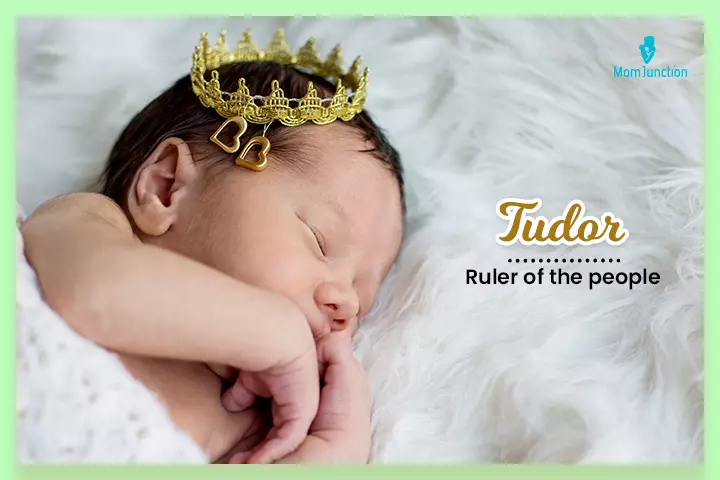
It is taken from the personal Welsh name ‘Tudur’ that comes from the Celtic word ‘Toutorix’ meaning ‘ruler of the people.’
92. Uren
It is a derivative of Brythonic personal name ‘Orbogenos’ that was known as ‘Urgen’ or ‘Urbgen’ in Old Welsh. Although the first element is unknown, the root word ‘gen’ represents ‘born’ or ‘birth.’
93. Vaughan
It is derived from the Welsh word ‘bychan’ that means ‘small’ or ‘little.’ The name would have originated to distinguish the younger of two bearers of the same personal name. The name could have also been a nickname.
94. Voyle
It originated from the Welsh word ‘moel’ meaning ‘bald.’ It may have begun as a reference to a bald person or a dry patch of land.
95. Wathen
It is a derivative of the Welsh personal name ‘Gwaiddan.’ The name ‘Gwaiddan’ is a toponymic one and likely refers to someone from the place called Robeston Wathen in Wales.
96. Williams
It is a patronymic surname that means ‘son of William.’ The name William comes from the Old German name ‘Willahelm’ composed of the Old Germanic elements, ‘wil’ meaning ‘desire’ and ‘helm’ meaning ‘helmet’ or ‘protection.’ It is one of the most common last names that start with W.
97. Wogan
It is derived from the Old Welsh personal name ‘Gwgan’ or ‘Gwgon’ that comes from the Welsh word ‘gwg,’ meaning to ‘frown.’
98. Wynn
It is a variant of the Welsh name ‘Wyn’ that comes from the Welsh word ‘gwyn’ meaning ‘white’ or ‘fair’ or ‘blessed.’ Some other variants of the surname Wynn are Wyne and Gwynne.
99. Yale
It is a toponymic name derived from the Welsh word ‘ial’ that refers to a ‘fertile upland.’ The name originally may have referred to people who came from a place that was a fertile upland.
100. Yarwood
It is an anglicized form of Welsh personal name ‘Iorwerth,’ with the Welsh elements ‘ior,’ meaning ‘lord,’ and a lenited form of ‘berth,’ meaning ‘handsome.’
Discover More Names
When you have to choose a name for your baby, a few hundreds of names may not be just enough. Keep digging our mine of baby names until you find that one precious gem.
Frequently Asked Questions
1. Why are Welsh surnames first names?
Welsh surnames are not entirely first names but do include first names as a part. Most Welsh surnames are patronymic, meaning they represent a person’s father. The surname consists of the father’s name and a prefix, which states that “they are a son of -.” A few families might decide to skip this prefix and use the father’s first name as a child’s surname.
2. When did the Welsh start using surnames?
The Welsh surnames could be dated back to the 1300s when 50% of the names followed the patronymic system. A few surnames also included the place of origin of the family members.
3. How do Welsh surnames work?
Welsh surnames typically follow a patronymic naming system, where a person’s last name is derived from their father’s first name. For example, if a person’s father’s name is John, their surname would be “Jones,” meaning ‘son of John.’ Matronymic surnames based on the mother’s name are less common but can also be found in some cases.
4. Why are there so few last names in Wales?
The relatively limited number of last names in Wales can be attributed to a combination of factors. Firstly, the patronymic naming system, where surnames are derived from the father’s first name, leads to a smaller pool of potential surnames compared to systems based on occupations or locations. Secondly, Wales has historically had a smaller population compared to other countries, resulting in fewer distinct surnames. Lastly, the influence of English naming conventions and cultural assimilation over time may have further reduced the diversity of Welsh surnames.
5. Why do Welsh have English surnames?
The presence of English surnames among Welsh can be attributed to historical and cultural factors. During various periods, including English rule and colonization, English names and naming conventions were introduced to Wales. This influence resulted in the adoption of English surnames by some Welsh families over time. Additionally, as Wales became more integrated with the broader English-speaking world, individuals and families may have chosen or been assigned English surnames for various reasons, including societal pressures, administrative purposes, or personal preferences.
6. Can Welsh surnames give us any insight into Welsh culture and history?
Yes, the patronymic naming system, which was prevalent in Wales for many centuries, reflects the importance of kinship and familial ties in Welsh society. Surnames derived from the father’s first name, such as Jones (son of John) or Davies (son of David), highlight the significance of lineage and ancestry. Additionally, some Welsh surnames have origins rooted in the Welsh language, mythology, or local geography, reflecting the country’s rich cultural heritage.
7. How do Welsh surnames differ between North and South Wales?
While there are some regional variations in Welsh surnames between North and South Wales, the differences are not significant enough to establish clear-cut patterns. The patronymic naming system, which forms the basis of Welsh surnames, is generally consistent throughout the country. However, it is worth noting that specific surnames may have variations or prevalence in certain areas due to localized factors such as migration patterns, historical events, or linguistic influences.
8. Can you trace your ancestry through your Welsh surname?
Tracing one’s ancestry through a Welsh surname can be challenging due to the patronymic naming system traditionally used in Wales. Welsh surnames are typically derived from the father’s first name, making it more difficult to trace a direct ancestral line through the surname alone. However, other sources such as historical records, genealogical research, and family traditions can provide valuable information to help trace one’s Welsh ancestry beyond the surname.
9. How have Welsh surnames changed over time, and what factors have influenced those changes?
Welsh surnames have experienced changes influenced by factors like English influence, cultural assimilation, migration, administrative requirements, and personal preference. These have led to the adoption of English and Victorian last names and modifications to traditional patronymic naming practices.
10. Are Welsh surnames still popular today, and if so, why?
Yes, Welsh surnames are still popular today due to their cultural significance, preservation of Welsh heritage, and a sense of identity and belonging. Many individuals and families take pride in their Welsh roots and choose to maintain traditional Welsh surnames as a way to honor their ancestry and cultural heritage.
The beautiful country of Wales is home to Welsh people whose surnames, like most countries’ naming system, gives a glimpse into their ancestral history and origin. So if you want a virtual tour of Wales and its people, starting with this list of common and unique Welsh surnames or last names can help you. Besides, knowing about a country’s naming system and the different surnames will help you broaden your knowledge. So this collection of surnames can enlighten you about the people of Wales and their history.
Infographic: Common Welsh Surnames
Wales is a region of rich history and culture reflected in its names that always seem to stand out and be easily recognized. If you are a proud Welsh or are fascinated by the its culture, naming your child after it may be a good way to honor your love and interest in it.
Some thing wrong with infographic shortcode. please verify shortcode syntax
Welsh surnames have interesting meanings and symbolism. Watch this video to explore the deeper meaning of the popular Welsh surname Davies and the occupation of people with this surname.
References
References
- Bethel.
https://www.newworldencyclopedia.org/entry/Bethel - Carew.
https://one-name.org/name_profile/carew/ - Who was Elijah in the Bible?
https://www.gotquestions.org/life-Elijah.html - Who was James, the brother of Jesus in the Bible?
https://www.gotquestions.org/life-James.html - Who was John the Apostle in the Bible?
https://www.gotquestions.org/life-John-Apostle.html - Who was Saint Thomas the Apostle?
https://stthomastheapostle.org/about/who-was-saint-thomas-the-apostle/#:~:text=St.,but%20impetuous%20follower%20of%20Christ.
Community Experiences
Join the conversation and become a part of our nurturing community! Share your stories, experiences, and insights to connect with fellow parents.
Read full bio of Shikha Thakur
Read full bio of Srija Chanda Burman
Read full bio of N Pravenchandra Singh





